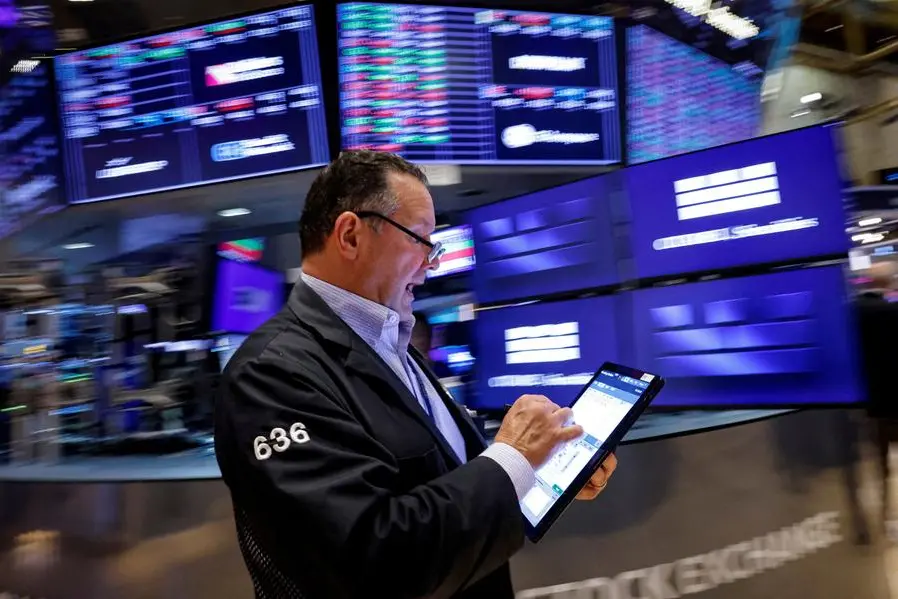PHOTO
The benchmark 10-year Treasury yield rose to 4% on Monday, after last week's U.S. labour market data dispelled fears of a recession and pared rate cut bets, supporting the dollar and keeping equities in check near record highs.
Major data this week is not due until Thursday in the form of U.S. CPI. Until then, barring political or geopolitical surprises, the tone for global markets is likely to remain set by Friday's payrolls report which showed the U.S. economy unexpectedly added the most jobs in six months in September.
Markets slashed bets on a 50-basis-point rate cut at the Federal Reserve's next policy announcement on Nov. 7 - which had been above 50% a week ago.
That sent yields on government bonds higher, and the benchmark 10-year Treasury yield hit 4% for the first time in two months on Monday, up 2 basis points on the day and building on Friday's 13 bp surge.
The rate-sensitive two-year yield climbed to as high as 4.016%, rising above the 10-year yield for the first time in three weeks, as investors try to get a grip on the health of the world's largest economy, and what it means for the data-dependent Federal Reserve.
Speeches by Fed policymakers this week will be particularly closely watched as a result, though on the whole, trying to get a grip on the latest data is a good problem for markets to have.
"What came out of last week is pretty obvious, if we just stick to the macro economic situation, there is no recession, no inflation, central banks are in a rate cutting cycle and, on top of that, China is contributing to this story too, so let's enjoy," said Samy Chaar, chief economist at Lombard Odier.
U.S. S&P500 futures fell 0.4%, though the index gained 0.9% Friday, and is back around all-time highs.
"If you want to think about risks, the purely economic risks have passed - except for some less straightforward stories in Europe centred around Germany - but there's geopolitics and the U.S. elections are getting closer," said Chaar.
Hezbollah rockets hit Israel's third largest city Haifa early on Monday as the country looked poised to expand ground incursions into southern Lebanon on the first anniversary of the Gaza war, which has spread conflict across the Middle East.
Brent crude oil futures were up 1.8% at $79.47 a barrel, just shy of Friday's one-month high, having posted the biggest weekly gain in more than a year last week.
Shares in Europe, which had risen in the aftermath of the jobs data, were broadly flat on Monday with gains in banks, which benefit from higher rates, balanced by falls in real estate, which does not.
Asia shares rose ahead of Chinese onshore markets' return from holiday on Tuesday, with investors waiting to see whether the surge in stocks on news of incoming economic stimulus will continue.
STRONG DOLLAR
Higher U.S. yields supported the dollar, particularly against the Japanese yen, with the greenback pushing as high as 149.10 yen in Asia trade for the first time since Aug. 16.
Gains were arrested after Japan's top currency diplomat, Atsushi Mimura, said officials were monitoring foreign exchange moves, including speculative trading, "with a sense of urgency". The dollar was last at 148.3 yen.
The dollar index, which tracks the currency against a basket including the euro, yen and pound, was at 102.5, a whisker off a seven-week top hit on Friday.
European Central Bank policymakers now appear increasingly willing to cut rates this month, in line with market pricing, removing one factor that had supported the euro against the dollar.
French Central Bank Chief Francois Villeroy de Galhau was the latest to join the chorus, telling an Italian newspaper in remarks published on Monday, that a rate cut in October was quite probable.
But euro zone bonds were focused on developments on the other side of the Atlantic and the German 10-year Bund yield rose 4 bps to 2.54%, a one-month high.
Gold was flat at $2,650 an ounce.
(Reporting by Kevin Buckland; Editing by Jamie Freed, Kirsten Donovan and Susan Fenton)




















